
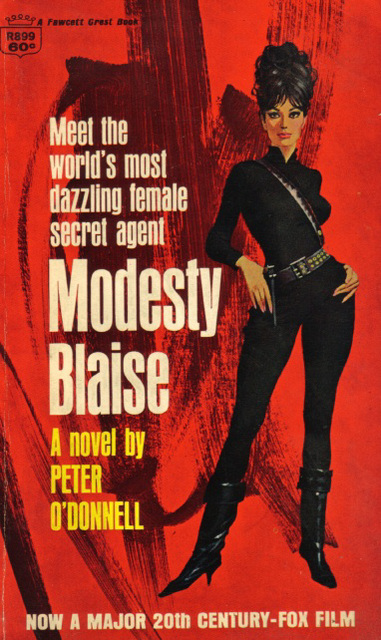 British author Peter O’Donnell created the iconic character of Modesty Blaise in 1963 as the heroine of an action adventure comic strip. He didn’t do the art work for the strip (that was done by four successive artists altogether), but he was responsible for the storylines and printed matter during the whole 38-year run, continuing until 2001. (These original strips are currently being reprinted as a series of graphic novels.) It quickly proved popular enough that 20th-Century Fox enlisted him to write a screenplay for a spin-off movie, which he did. However, he approached the character and the project seriously; and the filmmakers decided that they wanted to produce a parody of the James Bond films instead.
British author Peter O’Donnell created the iconic character of Modesty Blaise in 1963 as the heroine of an action adventure comic strip. He didn’t do the art work for the strip (that was done by four successive artists altogether), but he was responsible for the storylines and printed matter during the whole 38-year run, continuing until 2001. (These original strips are currently being reprinted as a series of graphic novels.) It quickly proved popular enough that 20th-Century Fox enlisted him to write a screenplay for a spin-off movie, which he did. However, he approached the character and the project seriously; and the filmmakers decided that they wanted to produce a parody of the James Bond films instead.
So, they brought in another writer to rework his screenplay, and ended up only keeping one sentence of it. Surprisingly, though, they asked O’Donnell, not his replacement, to do the novelization. He did –but he used his screenplay as the basis. That became the book I’m reviewing here, which was published in 1965 and sparked a long-running series of novels and stories, all with original plots distinct from those of the comic strips. (Meanwhile, the movie, with its caricature of Modesty in the main role, hit the screens in 1966, but failed to spark any fan enthusiasm comparable to what the books and comics generated.)
O”Donnell’s Modesty is a fascinating, complex and layered character, with an unusual back-story that’s provided in its basics at the beginning of this book, but fleshed out more as the tale unfolds. Born about 1939 –she doesn’t know exactly when, nor what her real name and nationality is– she was orphaned as a small child in the chaos and atrocities of World War II, and wandered alone through the Balkans and Middle East, sometimes living in refugee or DP camps. Exposed to a lot of danger and brutality, she survived against all odds because she learned to defend herself and to develop a tough, pragmatic mentality. As a tween, she was mentored by another refugee, a former university professor (whom she protected, rather than the other way around) who taught her a great deal; intelligent and gifted with a good memory, she’s well-educated as a result.
Winding up in Tangier at 17, she soon succeeded to the leadership of a criminal gang, and built it into a substantial international organization, the Network, that engaged in art and jewel thefts, currency manipulations, smuggling, and intelligence brokering. She did NOT, however, engage in drug or sex trafficking (and sometimes provided the authorities with tips that enabled them to bust drug operations); her criminal activities violated the law, but never her own personal moral code and sense of honor. (It was during her Network days that she forged her abiding friendship with Willie Garvin, a skilled knife-fighter whose life had pretty much hit bottom until she saw his potential and recruited him; he would become her lieutenant and faithful sidekick.) Having amassed her goal of half a million pounds sterling by the time she was about 25, she turned the Network over to its regional bosses and she and Willie (also wealthy by that time) retired to a quiet life in England.
The book opens about a year later, when she’s bored and restive, increasingly aware that she’s psychologically geared to find fulfillment and purpose in high-risk physical action, and doesn’t feel really alive when she’s vegetating without it. At this point, she’s approached by Sir Gerald Tarrant, head of British Intelligence (who did business with her, through Willie, when she was brokering items of information that interested the British government). As partial payment to a Middle Eastern sheik for an oil concession, Britain is shipping ten million pounds worth of diamonds from South Africa to Beirut –and there are rumors that the secrecy of the shipment has been compromised, and that someone may be out to steal it. Being aware of Modesty’s unique wide knowledge of, and contacts in, the international underworld, Tarrant would like her to check this out for him. First, though, she’ll have another priority on the agenda –rescuing Willie (also bored and restive) from the South American prison where he’s awaiting execution, having been a mercenary on the losing side in a civil war.
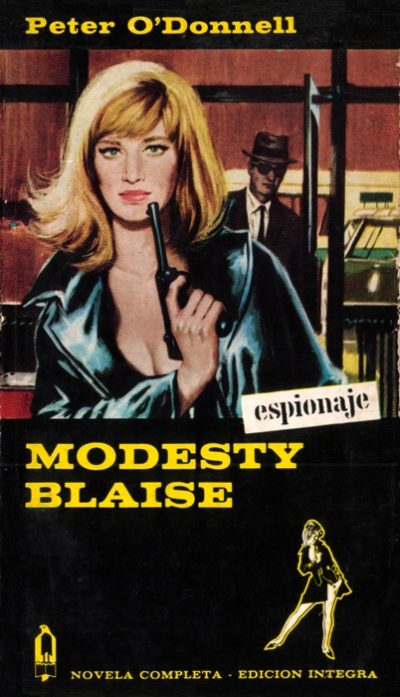 O’Donnell is a master of characterization; not just Modesty and Willie, but all of the secondary characters here too, are wonderfully wrought, full-orbed and realistic. The plotting is taut and well-paced, with no unnecessary filler, and there’s a real sense of danger and challenge. It’s clear that the author has a very good working knowledge of traditional Arab culture, which adds texture here. Unlike Ian Fleming, he doesn’t go in for far-fetched gadgetry, but he does endow his heroine and hero with some believable gadgets and an ability to secrete them on their person. He writes action scenes that are clear, vivid and gripping; and he sets his action in the context of a moral framework –recognizable good is pitted here against genuine evil, and O’Donnell makes us root wholeheartedly for the former and despise the latter. Modesty herself is no plaster saint; I didn’t approve of everything she’s done in her life, or every aspect of her lifestyle now. But I could understand her motivations, and didn’t have any trouble liking and respecting her as a heroine –she has a lot of very real virtues, is a born leader and as valiant a fighter as ever lived, cares about others and treats them decently, and respects innocent life (and will spare adversaries’ lives at times when some people in her shoes probably wouldn’t).
O’Donnell is a master of characterization; not just Modesty and Willie, but all of the secondary characters here too, are wonderfully wrought, full-orbed and realistic. The plotting is taut and well-paced, with no unnecessary filler, and there’s a real sense of danger and challenge. It’s clear that the author has a very good working knowledge of traditional Arab culture, which adds texture here. Unlike Ian Fleming, he doesn’t go in for far-fetched gadgetry, but he does endow his heroine and hero with some believable gadgets and an ability to secrete them on their person. He writes action scenes that are clear, vivid and gripping; and he sets his action in the context of a moral framework –recognizable good is pitted here against genuine evil, and O’Donnell makes us root wholeheartedly for the former and despise the latter. Modesty herself is no plaster saint; I didn’t approve of everything she’s done in her life, or every aspect of her lifestyle now. But I could understand her motivations, and didn’t have any trouble liking and respecting her as a heroine –she has a lot of very real virtues, is a born leader and as valiant a fighter as ever lived, cares about others and treats them decently, and respects innocent life (and will spare adversaries’ lives at times when some people in her shoes probably wouldn’t).
At one point, O’Donnell makes use of a double coincidence in his plotting, which some critics might fault him for. (But that personally didn’t bother me much; I ascribed it to the action of providence.) And while he drops the names of various firearms models to lend verisimilitude to his narrative, he makes a couple of bloopers in his treatment of guns. Also, he describes technical processes at places in the narrative in more detail than I would (I have a low tolerance for that kind of thing), but he usually has a good reason to, and does it with reasonable clarity; some fans will actually regard this as a strength of the writing. One major character displays some sexist attitudes, but I didn’t think O’Donnell was sharing in or justifying them, just realistically depicting the way many males in 1965 thought (and still do).
There’s a high body count here, but the violence is handled quickly and cleanly; while some of the villains are sadists, O”Donnell isn’t. There’s some bad language, and a certain amount of religious profanity, but no obscenity. While there’s no explicit sex, it’s made clear that unmarried sex took place a few times, and will again; Willie and Modesty are single, but not celibate. (Their relationship with each other, though, is perfectly chaste and Platonic –they genuinely do love each other, and would die for each other, but as true friends, not as erotic partners.)
In this book, it’s noted in passing that Modesty has been raped twice in her life. As it stands, that’s just a reflection of the tragic fact that women in our world often do face a lot of sexual violence; and she isn’t defined by the experience, and doesn’t have a victim mentality that allows it to permanently scar her life, which is positive modeling. But I’m told by other readers that in the other books of the series (though not the comics) Modesty tends to be raped quite frequently. To me, that’s a disturbing amount of sexual violence for one character to have to undergo; and it does seem like a morbid overuse of the motif. But that said, I’m still invested enough in this heroine and her future adventures to continue reading the series!
Author: Peter O’Donnell
Publisher: Souvenir Press, available through Amazon, currently only as a printed book.
A version of this review previously appeared on Goodreads.
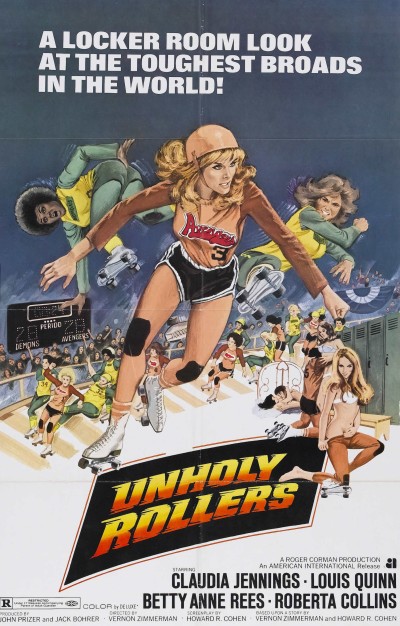 Winner of Most Unexpected Credit goes to this roller-derby exploitation flick, out of cheapie producers American International, because the opening credit proclaim, “Supervising Editor – Martin Scorsese.” Yep. THAT Scorsese, the year before anyone much noticed him with Mean Streets, worked on what would now be called a “mockbuster” – Scorsese later describing it in Scorsese on Scorsese as “the rip-off of the Racquel Welch movie about roller-derbys, Kansas City Bombers“. However, it ended up trailing in to cinemas in Bombers‘ wake and, according to its editor, “was destroyed.” That’s a shame, as there’s a nicely gritty feel to this, which rings true. It certainly acknowledges that the action and fights in roller-derby may be staged, but – as we’ve seen in the local roller-derby scene – the inter-personal dramas are entirely real. It also reminded me of the independent pro wrestling world, of which we’ve had some experience, promoter Mr. Stern (Quinn) harping on about showmanship, perpetually aware of the need to give his audience what they want.
Winner of Most Unexpected Credit goes to this roller-derby exploitation flick, out of cheapie producers American International, because the opening credit proclaim, “Supervising Editor – Martin Scorsese.” Yep. THAT Scorsese, the year before anyone much noticed him with Mean Streets, worked on what would now be called a “mockbuster” – Scorsese later describing it in Scorsese on Scorsese as “the rip-off of the Racquel Welch movie about roller-derbys, Kansas City Bombers“. However, it ended up trailing in to cinemas in Bombers‘ wake and, according to its editor, “was destroyed.” That’s a shame, as there’s a nicely gritty feel to this, which rings true. It certainly acknowledges that the action and fights in roller-derby may be staged, but – as we’ve seen in the local roller-derby scene – the inter-personal dramas are entirely real. It also reminded me of the independent pro wrestling world, of which we’ve had some experience, promoter Mr. Stern (Quinn) harping on about showmanship, perpetually aware of the need to give his audience what they want.




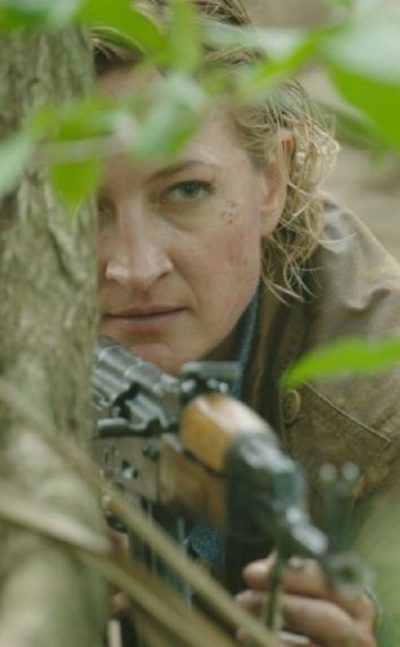
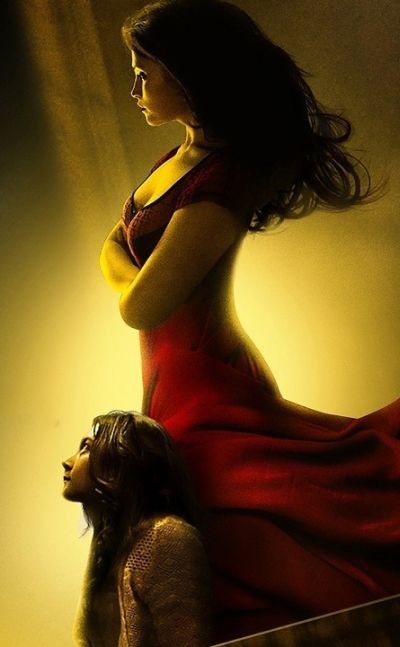 Ok, that’s probably not strictly accurate, but there is more than a hint of it, in the way this manages to combine period drama with Gothic horror trappings – while also depicting the same characters in the present day. This slipping back and forth in time is somewhat distracting, and there are points where you wish they had just picked an era and stuck with it. The heroines here are a pair of mother and daughter vampires (Arterton and Ronan), who have been more or less on the run for about two centuries. For the mother, Clara, was a terminally-ill prostitute who stole the secret of vampirism from her client, Captain Ruthven (Jonny Lee Miller) in the early 19th century. She not only became immortal herself, she turned her daughter, Eleanor – an act strictly against the tenets of The Brethren, who are kinda like the vampire union, who put out a death-warrant on the pair. In the present day, this means Clara – still turning tricks to provide for Eleanor – has occasionally to decapitate people with a garrotte, should they turn out to be hunters sent by The Brethren.
Ok, that’s probably not strictly accurate, but there is more than a hint of it, in the way this manages to combine period drama with Gothic horror trappings – while also depicting the same characters in the present day. This slipping back and forth in time is somewhat distracting, and there are points where you wish they had just picked an era and stuck with it. The heroines here are a pair of mother and daughter vampires (Arterton and Ronan), who have been more or less on the run for about two centuries. For the mother, Clara, was a terminally-ill prostitute who stole the secret of vampirism from her client, Captain Ruthven (Jonny Lee Miller) in the early 19th century. She not only became immortal herself, she turned her daughter, Eleanor – an act strictly against the tenets of The Brethren, who are kinda like the vampire union, who put out a death-warrant on the pair. In the present day, this means Clara – still turning tricks to provide for Eleanor – has occasionally to decapitate people with a garrotte, should they turn out to be hunters sent by The Brethren.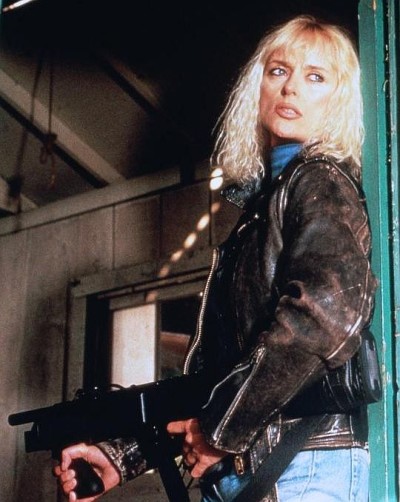



 A straightforward yet effective cross between a slasher film and Die Hard, sees Alicia (Garcia-Jonsson) plan a birthday dinner for her boyfriend, Simon (Sevilla) in an almost deserted apartment building. However, she stumbles into a plot to evict the last remaining tenant… in a body-bag. Trapped inside the locked tenement, the young couple become the target, first for the evictors, and then their boss, the Liquidator (Tarrida), as they seek to cover the tracks of their murderous work.
A straightforward yet effective cross between a slasher film and Die Hard, sees Alicia (Garcia-Jonsson) plan a birthday dinner for her boyfriend, Simon (Sevilla) in an almost deserted apartment building. However, she stumbles into a plot to evict the last remaining tenant… in a body-bag. Trapped inside the locked tenement, the young couple become the target, first for the evictors, and then their boss, the Liquidator (Tarrida), as they seek to cover the tracks of their murderous work.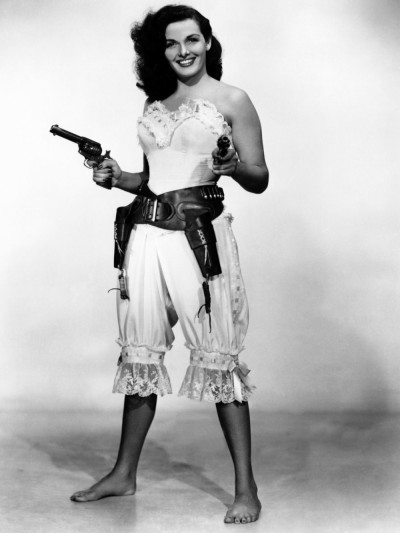
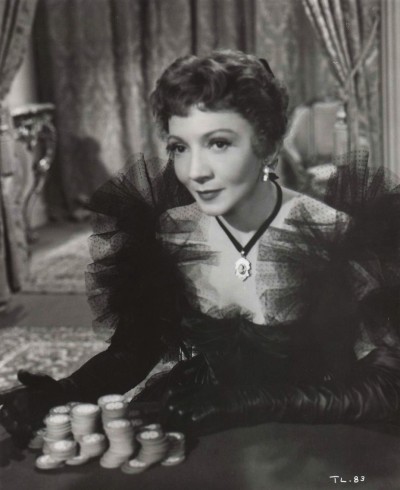
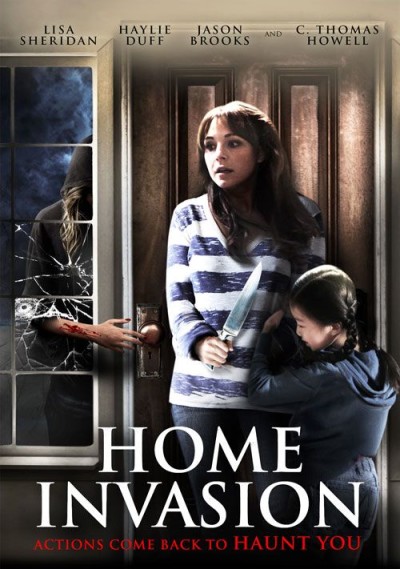 Nicole Johnson (Sheridan) comes home with her daughter to find a robbery in progress, but is a well-armed home-owner and ends up blowing away one of the intruders. The other, Ray (Howell), bails with their getaway driver, Jade (Duff), who was also the dead perp’s girlfriend. She vows to take vengeance on Nicole and her family, in a variety of forms, from posing as a swimming teacher, to poisoning the customers at Nicole’s restaurant, then setting the place on fire and framing her for arson. Plus, of course, she’s a believer in the old Biblical law of an eye for an eye – or, in this case, a boyfriend for a boyfriend, Jade fixing to inject her nemesis’s other half with that old “undetectable poison”, potassium chloride. I have probably just got myself on a government watch-list by Googling that. Should have done it on my boss’s computer. Oh, well….
Nicole Johnson (Sheridan) comes home with her daughter to find a robbery in progress, but is a well-armed home-owner and ends up blowing away one of the intruders. The other, Ray (Howell), bails with their getaway driver, Jade (Duff), who was also the dead perp’s girlfriend. She vows to take vengeance on Nicole and her family, in a variety of forms, from posing as a swimming teacher, to poisoning the customers at Nicole’s restaurant, then setting the place on fire and framing her for arson. Plus, of course, she’s a believer in the old Biblical law of an eye for an eye – or, in this case, a boyfriend for a boyfriend, Jade fixing to inject her nemesis’s other half with that old “undetectable poison”, potassium chloride. I have probably just got myself on a government watch-list by Googling that. Should have done it on my boss’s computer. Oh, well….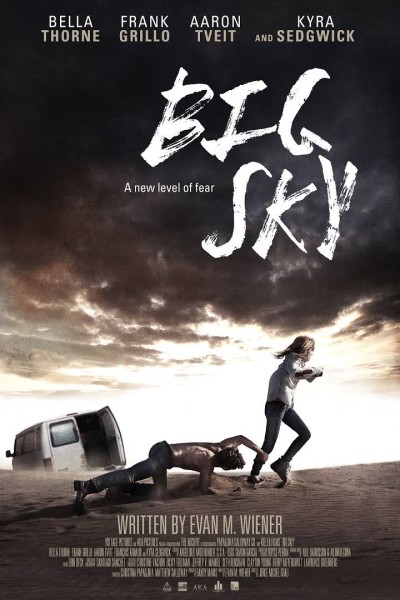 Hazel (Thorne) suffers from severe agoraphobia, which has left her trapped in her room, but her mother, Dee (Sedgwick) has finally succeeded in convincing Hazel to seek treatment. A ride is arranged to a treatment centre in the middle of the desert: to help Hazel cope, she’ll travel in the blacked-out back of the van, with her mother up front. However, on the way, the van is ambushed and another passenger kidnapped. The perpetrators, brothers Jesse and Pru (Grillo and Tveit), shoot everyone else to cover their tracks, but don’t notice Hazel in the back. Dee is badly wounded, and their only hope of survival is for Hazel to overcome her fear and head out across the wide-open landscape for help. However, the brothers have realized they left some loose ends, and Pru – who has significant mental issues of his own – is sent back to tidy up the survivors.
Hazel (Thorne) suffers from severe agoraphobia, which has left her trapped in her room, but her mother, Dee (Sedgwick) has finally succeeded in convincing Hazel to seek treatment. A ride is arranged to a treatment centre in the middle of the desert: to help Hazel cope, she’ll travel in the blacked-out back of the van, with her mother up front. However, on the way, the van is ambushed and another passenger kidnapped. The perpetrators, brothers Jesse and Pru (Grillo and Tveit), shoot everyone else to cover their tracks, but don’t notice Hazel in the back. Dee is badly wounded, and their only hope of survival is for Hazel to overcome her fear and head out across the wide-open landscape for help. However, the brothers have realized they left some loose ends, and Pru – who has significant mental issues of his own – is sent back to tidy up the survivors.